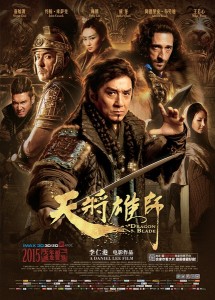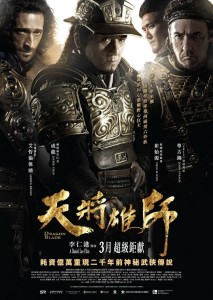Dragon Blade
天将雄师
Hong Kong/China, 2015, colour, 2.35:1, 3-D (China only), 127 mins.
Director: Li Rengang 李仁港 [Daniel Lee].
Rating: 4/10.
Ancient Rome meets Ancient China in a lame Cheng Long [Jackie Chan] vehicle with a laughable script.
Somewhere in Western China, the present day. After buying a Han dynasty military handbook that says Romans built a city called Regum 2,000 years ago in China, a US archaeological company sends an expedition to verify the story. Two of its members, Christian (Wu Jianhao) and Karena (Lin Jiaxin), find the ruins of the city in some snow-covered mountains and re-imagine it using a virtual simulator. Somewhere in the border region of Western China, the Silk Road, 48 B.C.: 36 tribal groups struggle against each other for survival in the desert region. Policing the vital east-west trade route is the Silk Road Protection Squad, under Huo An (Cheng Long), an orphan who was raised by a Chinese general, Huo Qubing (Feng Shaofeng), who taught him the principles of racial equality. While mediating between two warring tribes, the Bairong led by Alisijiang (Walisi Yisilamu) and the Southern Huns led by Tiexie (Li Zhenqi), he gets into single combat with Hun warrior  princess Lengyue (Lin Peng) and accidentally loosens her veil, signifying that she is now his wife. Lengyue later tries to give herself to Huo An, but he flees back home to his wife, Xiuqing (Wang Ruoxin), a Uyghur primary school teacher. However, Huo An and his whole team are arrested on the orders of the prefecture’s chief for smuggling gold outside China, and are sent to Wild Geese Gate in the border region to help rebuild the city. An 800-strong Roman army, commanded by Lucius (John Cusack), appears and attacks; after the city’s captain (Xiao Yang) is caught in a trap, Huo An takes command and engages in single combat with Lucius. The fight is interrupted by a sandstorm and Huo An offers refuge to the Romans, who are exhausted from their march. The Roman army also has a blind noble child, Publius (Jozef Waite), whom Lucius personally cares for. When the city commander receives an order to finish the rebuilding in 15 days – an impossible task – the Romans offer to do the job if the Chinese help them to send an envoy to Parthia. After the re-building is finished, Lucius explains to Huo An that Publius is the younger son of Roman consul Marcus Licinius Crassus (Gregory Allen); after concluding a treaty with the Parthians, Crassus entrusted Lucius with Publius’ safety, as he didn’t trust his elder son, Tiberius (Adrien Brody); Tiberius first blinded Publius and then killed his own father, and is now hunting Lucius. Huo An offers to help Lucius and his men fight Tiberius, who is due to arrive any day.
princess Lengyue (Lin Peng) and accidentally loosens her veil, signifying that she is now his wife. Lengyue later tries to give herself to Huo An, but he flees back home to his wife, Xiuqing (Wang Ruoxin), a Uyghur primary school teacher. However, Huo An and his whole team are arrested on the orders of the prefecture’s chief for smuggling gold outside China, and are sent to Wild Geese Gate in the border region to help rebuild the city. An 800-strong Roman army, commanded by Lucius (John Cusack), appears and attacks; after the city’s captain (Xiao Yang) is caught in a trap, Huo An takes command and engages in single combat with Lucius. The fight is interrupted by a sandstorm and Huo An offers refuge to the Romans, who are exhausted from their march. The Roman army also has a blind noble child, Publius (Jozef Waite), whom Lucius personally cares for. When the city commander receives an order to finish the rebuilding in 15 days – an impossible task – the Romans offer to do the job if the Chinese help them to send an envoy to Parthia. After the re-building is finished, Lucius explains to Huo An that Publius is the younger son of Roman consul Marcus Licinius Crassus (Gregory Allen); after concluding a treaty with the Parthians, Crassus entrusted Lucius with Publius’ safety, as he didn’t trust his elder son, Tiberius (Adrien Brody); Tiberius first blinded Publius and then killed his own father, and is now hunting Lucius. Huo An offers to help Lucius and his men fight Tiberius, who is due to arrive any day.
REVIEW
Cheng Long 成龙 [Jackie Chan] and an East-West cast wage a hopeless battle against a laughable script and overwhelming production design in Dragon Blade 天将雄师, the veteran Hong Kong star’s first costume action drama since Little Big Soldier 大兵小将 (2010). A Hong Kong-sourced production shot in China using Mainland money, it’s written and directed by Hong Kong journeyman Li Rengang 李仁港 [Daniel Lee] with scant regard for history and even scanter regard for things like narrative coherency, characterisation and halfway decent dialogue. In recent years, the very variable Li has concentrated on large-scale historical movies – Three Kingdoms: Resurrection of the Dragon 三国之见龙卸甲 (2008), 14 Blades 锦衣卫 (2010), White Vengeance 鸿门宴传奇 (2011) – but this one is by far the weakest.
Li, who started as an art director and now regularly takes that credit too, has never been noted for the consistency of his scripts, which have all the faults of old-style, shoot-it-fast, Hong Kong production methods, especially in their throwaway third acts. In White Vengeance, based on a real historical event, he was clearly reaching beyond his dramatic grasp, falling back on action cliches during the second half. Dragon Blade claims to be “inspired by a true story” – actually, the theory that some Ancient Romans, remnants of Crassus’ army in Parthia (modern Iran), drifted eastwards to China in the 1st century B.C. – but is bereft of any intelligence or depth on a writing level. As a by-the-numbers action spectacle it just about crawls across the finishing line thanks to lavish production values; but given the interesting subject matter, and the high quality of so many Chinese historical dramas nowadays, it’s a lame effort.
For a film which parades its apparent authenticity, with use of multiple languages and detailed design, it’s grossly inaccurate on the Roman side, apart from some impressive mechanical detail in the building sequences. Costumes and architecture are more suitable to Rome’s Empire than the Republican period in which the story is set; and Roman sword and fighting techniques are ignored in the action sequences. That won’t trouble most audiences, and wouldn’t be so noticeable if the human drama was at all engaging; but the screenplay reduces the East-West meeting to a series of platitudes about peace, pan-nationalism and racial equality – all eagerly underscored by Cheng, who co-funded the film via his Mainland company Sparkle Roll, in a typically preachy performance.
Whether in Chinese or English, the dialogue is either bland or bloated, occasionally straining at profundity (“Power is a conceit which reveals our limitations”; “Peace and harmony: one; greed and ambition: zero”). More questionable is its pro-Han slant, in which China is seen as the progressive force for peace and unity among warring tribes and cultures. One exchange between Cheng’s avowedly liberal general Huo An and the weary Roman general Lucius is particularly squirmy. Lucius: “In Rome we are trained to obey from a young age.” Huo An: “We different. You train kill people. We train save people. I make Silk Road peace.” Right.
As Lucius, John Cusack has no chemistry with Cheng and consistently looks like he can’t wait to get out of uniform and on the next flight home. With no central relationship to bind the film together, it’s left to Adrien Brody to give it some hammy oomph in the second half as the villainous Tiberius, who comes hunting for Lucius and his men. Clearly deciding that the only way out is up, Brody chews the scenery with relish, putting not only Cusack but also Cheng in the shade. Now 60, Cheng has still not acquired any screen authority with age, unlike fellow Hong Kongers such as Hong Jinbao 洪金宝 [Sammo Hung], Zhou Runfa 周润发 [Chow Yun-fat] or Liang Jiahui 梁家辉 [Tony Leung Ka-fai]. He also continues to undercut himself in international productions by using the same cute Chinglish he’s been peddling for 35 years.
Supporting players only register peripherally. TV drama actress Wang Ruoxin 王若心 is thrown away in small role as Huo An’s goodie-two-shoes wife but Lin Peng 林鹏 (from Cheng’s Little Big Soldier and CZ12 十二生肖, 2012) makes more impression as a flashing-eyed Hun warrior. Another Cheng favourite, Korean American Yu Seung-jun 유승준 | 刘承俊 [Steve Yoo] (The Wrath of Vajra 金刚王 死亡救赎, 2013; CZ12), pretty much gets lost in all the ethnic mix, as does, for long stretches, South Korean boybander/actor Choi Shi-won 최시원 | 崔始源, who pops up in a big wig as Huo An’s untrustworthy sidekick. Hong Kong actress Lin Jiaxin 林嘉欣 [Karena Lam] and Taiwanese American singer Wu Jianhao 吴建豪 [Van Ness Wu] briefly bookend the film in an unnecessary modern sequence.
The score by Li Yunwen 李允文 [Henry Lai] includes some Middle East/Central Asian flavouring but is otherwise unremarkable. Along with the gritty desert photography by Li’s regular d.p. Zhang Dongliang 张东亮 [Tony Cheung], the richly-imagined Asian costumes by Zhuang Zhiliang 庄志良 [Thomas Chong] have a field day with all the ethnic differences and are the film’s standout accomplishment. Hong Kong editor Qiu Zhiwei 邱志伟 [Yau Chi-wai] keeps individual scenes tight and clipped, and it’s not his fault that the samey action starts to seriously pall in the second half, with a finale that just goes on and on and on. Action choreography, supervised by Cheng and his stunt team, includes some old Cheng chestnuts but little that’s fresh or innovative, and the sequences of Asian vs Roman combat hardly explore their possibilities.
The film’s Chinese title means “Heavenly General, Brave Master”.
CREDITS
Presented by Sparkle Roll Media (CN), Huayi Brothers Media (CN), Shanghai Film Group (CN), Sparkle Roll Culture & Entertainment Development (CN). Produced by Visualizer Film (HK).
Script: Li Rengang [Daniel Lee], Zhang Dongliang [Tony Cheung], Shi Lei. Photography: Zhang Dongliang [Tony Cheung]. Editing: Qiu Zhiwei [Yau Chi-wai]. Music: Li Yunwen [Henry Lai]. Songs: Li Yunwen [Henry Lai]. Lyrics: Xu Xiaorong, Wang Pingjiu, Li Rengang [Daniel Lee], Vladimir Fux. Vocals: Cheng Long [Jacky Chan], Wei Yunxi. Production design: Li Rengang [Daniel Lee], Zhuang Zhiliang [Thomas Chong]. Art direction: Huang Jia’neng [Eddy Wong]. Costume design: Zhuang Zhiliang [Thomas Chong]. Sound: Sun Xiaolin, Zheng Yingyuan [Phyllis Cheng], Steve Burgess, Ye Zhaoji. Action direction: Cheng Long [Jackie Chan]. Action choreography: He Jun, JC Stunt Team. Visual effects: Son Seung-hyeon, Gim Han-jun (Idea). 3-D: Charles Lee.
Cast: Cheng Long [Jackie Chan] (Huo An), John Cusack (Lucius), Adrien Brody (Tiberius), Lin Peng (Lengyue/Cold Moon), Wang Ruoxin (Xiuqing, Huo An’s wife), Choi Shi-weon (Yin Po, Huo An’s deputy), Xiao Yang (Wild Geese Gate captain), Wang Taili (Laoshu/Rat, Wild Geese gate medical officer), Hong Tianzhao (Hongri/Red Sun, Lengyue’s brother), Yu Seung-jun [Steve Yoo] (Shanbao/Cougar), Lorie Pester (Parthian queen), Wu Jianhao [Van Ness Wu] (Christian, archaeologist), Lin Jiaxin [Karena Lam] (Karena, archaeologist), Feng Shaofeng (Huo Qubing), Sharni Vinson (Lady Crassus), Xu Xiangdong (secretary), Xiu Qing (Hu/Wolf), Huang Youliang, Oz Tomer, Ailiku Kuerban, Guo Mingyu (Huo An’s deputies), Li Zhenqi (Tiexie, Southern Hun chief), Li Shaoting (lieutenant), Liu Jianwei (Ma Chuang), Jozef Waite (Publius), David Peck (Agrippa), Scotty Robert Cox (Falco), Gregory Allen (Marcus Licinius Crassus), Zhu Jiayu (young Huo An), Han Ziqi (Huo An’s younger sister), Walisi Yisilamu (Alisijiang, Bairong chief), Omar Akbar (Saklar chief), Wu Yonglun (Turkic chief), Senge Renqin (Uyghur chief), Yilmaz Emrah (Kusan chief).
Release: China, 19 Feb 2015; Hong Kong, 12 Mar 2015.
(Review originally published on Film Business Asia, 22 Mar 2015.)
